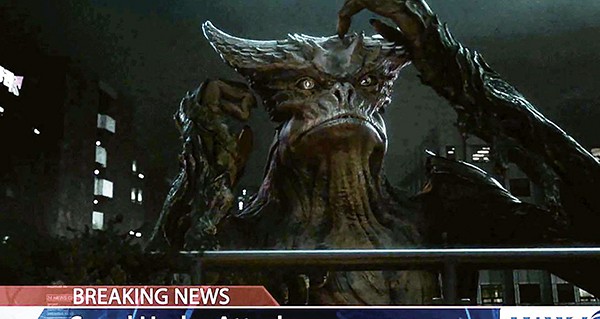When I am called upon to give lectures on screenwriting, one of the things I like to talk about is the Giant Robot Problem. It goes something like this: From Voltron to Optimus Prime to the Big O, everybody loves giant robots — especially the Japanese. What could be cooler than strapping into a 30-story, humanoid mecha and crushing your enemies beneath your giant metal boots? But if giant robots are so cool, why haven’t we built one yet? After all, we can put a man on the moon and take selfies with our lunch — why not Voltron?
The answer is, as cool as they look, giant robots aren’t really good for much. Anything a giant robot can do, you can use a specialized tool to do better. Need an invulnerable war machine? We have those. They’re called tanks. Want to dig a giant hole in the ground? You can either spend billions building a giant robot and give it a giant shovel, or you can just rent a commercial earth mover. Basically, the only things giant robots are good for are fighting giant monsters or other giant robots, and since neither one of those actually exists, we don’t build giant robots. This is why long-running anime series starring giant robots always evolve into soap operas about the people who drive the giant robots, proving that character development is always the most important element.
Director Nacho Vigalondo’s new film Colossal adds new dimensions to the eternal dance between giant monster and giant robot, while reinforcing the principle that character development is everything. Like any great kaiju movie, it begins in an Asian megalopolis — in this case, Seoul — with an innocent child witnessing the arrival of a giant monster. The dark, scaly, hundred-meter-tall creature materializes in a cloud of lightning and mystery, only to vanish again just as quickly.

Fast forward to 25 years later, and we meet Gloria (Anne Hathaway), a magazine writer in New York living with her boyfriend Tim (Dan Stevens). At least, Gloria used to be a magazine writer. She got laid off a year ago, and now she mostly just parties hard with her semi-glamorous publishing friends while mooching off of the dregs of Tim’s largesse. But Tim’s done watching her drink herself into an early grave, and he gives her the boot from his swank Manhattan apartment.
Thus, Gloria is faced with the ultimate nightmare of every young go-getter who goes to the Big Apple to get her fame and fortune: She has to move back home to the small town where she came from. Living alone in the vacant house where she grew up, she vows to quit drinking and get her life back on track. But her plan, and her sobriety, is instantly undermined in a chance meeting with Oscar (Jason Sudeikis), an old friend from elementary school who, wouldn’t you know it, runs the neighborhood watering hole. Soon, she’s working night shifts in the bar and staying after close to pound beers with Oscar, local loudmouth Garth (Tim Blake Nelson), and the quiet-but-hunky handyman Joel (Austin Stowell).
Around the same time, the mysterious monster reappears in Seoul. But this time, it’s back for all to see, trashing neighborhoods and killing hundreds of hapless Koreans as it rampages through the city. Only it’s not really rampaging so much as wandering aimlessly, seemingly distracted by invisible specters only it can see. The world pays rapt attention to the improbable drama, but Gloria notices something strange about the monster’s behavior. It seems to have the same tics she does, such as nervously scratching at the top of its head, and its uncoordinated ramblings look a lot like her movements when she’s stumbling home drunk every morning. Could she somehow be unwittingly controlling the monster? Meanwhile, her relationship with her childhood friend Oscar is taking an unhealthy, controlling turn — just as the giant monster of Seoul is joined by an equally mysterious giant robot.
Colossal‘s gimmick is gigantic, but the meat of this fascinating little picture is the interactions of a pair of ordinary, down-on-their-luck people just trying to create lives that make sense. Like Being John Malkovich, Colossal uses a fantastical premise to explore real human emotions and psychology. Hathaway and Sudeikis are both brilliant in this psychologically complex examination of how one person’s inner conflicts can ripple outward and affect people who have little to do with the original issues, even if, in this case, those people are being crushed underfoot half a world away.